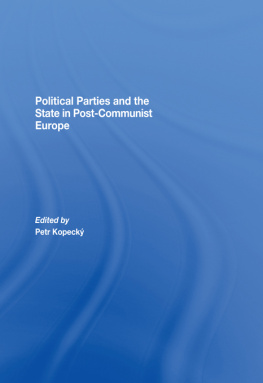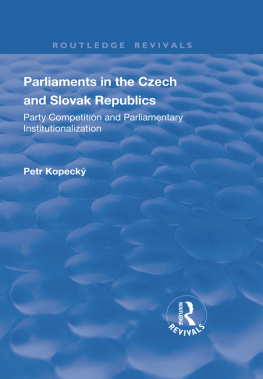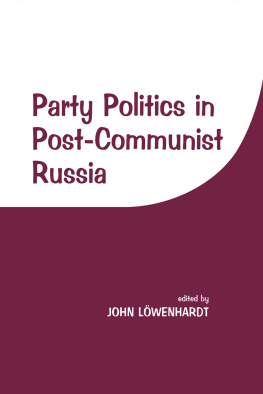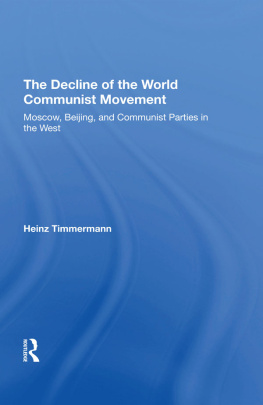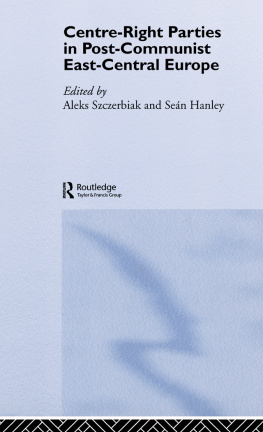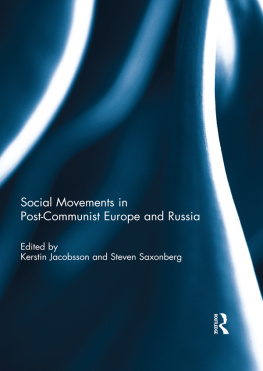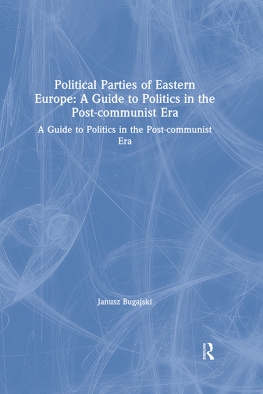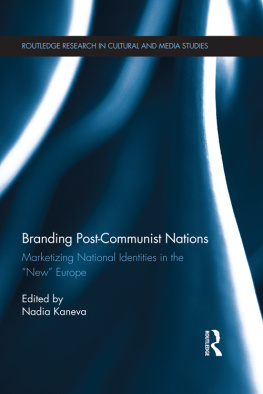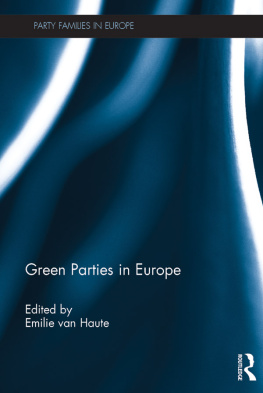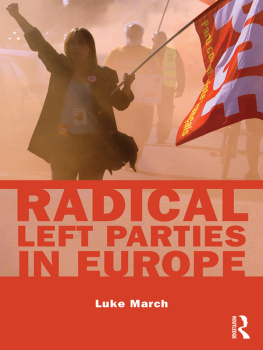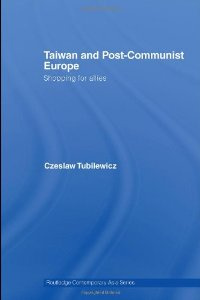Political Parties and the State in Post-Communist Europe
It is not possible to understand the nature and functioning of post-communist political parties without understanding their relationship with the state. On the one hand, few parties in the region would be able to survive and perform without state resources as they lack strong roots within the wider society. On the other hand, the relatively weak states inherited from the communist period offer parties and elites opportunities for various forms of rent-seeking within state institutions. But how can we understand the relationship between parties and the state? How do the party-state links work in practice and do they exhibit any cross-national or cross-party variation? Are there any discernible patterns of party-state linkages among the post-communist democracies?
Political Parties and the State in Post-Communist Europe addresses these questions. The partystate linkages are analyzed alongside three analytical dimensions: state financing of parties, their legal regulation, and party patronage within the state institutions. The book brings together case studies of post-communist countries, as well as cross-country comparative analysis, each addressing at least one of these analytical dimensions. Besides providing a framework within which studies of partystate relationship can be undertaken, the book thus brings comparative evidence on the extent and the manner in which parties in the region use the state for their own purposes.
This book was previously published as a special issue of The Journal of Communist Studies and Transition Politics.
Petr Kopeck is a Research Fellow of the Netherlands Organization for Scientific Research based in the Department of Political Science at Leiden University.
First published 2008 by Routledge
2 Park Square, Milton Park, Abingdon, Oxon, OX14 4RN
Simultaneously published in the USA and Canada
by Routledge
270 Madison Avenue, New York, NY 10016
Routledge is an imprint of the Taylor & Francis Group, an informa business
2008 Petr Kopeck
Typeset in Times Roman by Techset Composition, Salisbury, UK
Printed and bound in Great Britain by MPG book Ltd, Bodmin, Cornwall
All rights reserved. No part of this book may be reprinted or reproduced or utilised in any form or by any electronic, mechanical, or other means, now known or hereafter invented, including photocopying and recording, or in any information storage or retrieval system, without permission in writing from the publishers.
British Library Cataloguing in Publication Data
A catalogue record for this book is available from the British Library
Library of Congress Cataloging in Publication Data
A catalog record for this book has been requested
ISBN 10: 0-415-43959-0 (hbk)
ISBN 13: 978-0415-43959-6 (hbk)
Contents
Petr Kopeck
Petr Kopeck
Jan-Hinrik Meyer-Sahling
Aleks Szczerbiak
Marek Ryb
Allan Sikk
Steven D. Roper
Hans Oversloot and Ruben Verheul
The online edition of this journal is hosted by Metapress: taylorandfrancis.metapress.com
For details of past and future contents of this and our other journals as well as guidance on gaining access to this journal online please visit our website at www.tandf.co.uk/journals
This collection of essays examines the relationship between political parties and the state in post-communist Europe. Observers of post-communist politics generally agree that this relationship is very important for understanding the performance of the new East European democracies in general and of their political parties in particular. There are at least three interrelated reasons why the stateparty linkage is highly significant. First, parties in the post-communist region generally lack strong roots within the wider society. As a result, very few of them would be able to survive and perform without state resources. Second, the principal task of post-communist parties and elites has been to rebuild the institutions of the state. As a consequence, parties in the post-communist countries have been in a unique and strong position to define the rules of the game so as to cement their position within the state institutions. Third, the state structures inherited from the communist period are relatively weak in resisting intervention by political elites. As a result, post-communist states offer parties and elites opportunities for various forms of rent-seeking within state institutions.
While there is little doubt about the importance of the partystate relationship, there is less agreement about and indeed knowledge of how these links work in practice, and whether they exhibit any cross-national, cross-party or cross-temporal variation. The present collection aims to fill this void. The studies assembled here are not guided by a tight theoretical or conceptual framework of partystate linkage. The contributors were encouraged to adopt their own analytical approach in the study of a specific country. However, my intention from the outset was to widen the focus of most existing research, and move beyond the study of state financing of political parties as the main or even the sole indicator of the partystate link. Therefore, in addition to (or even instead of) state party finance, all contributions also consider party patronage within state institutions, and the legal framework within which political parties operate, as two other key dimensions of the partystate relationship. It is particularly the matter of party rent-seeking within the state that gives this collection a relatively novel focus at both the theoretical and the empirical level.
One of the included articles was presented, in an earlier version, at my two panels on Patronage and Corruption in New Democracies at the Third ECPR Conference in Budapest, in September 2005. All but two articles were presented and discussed at a workshop entitled Political Parties and the State in Central and Eastern Europe, organized in Leiden in November 2005. I would like to thank the Department of Political Science at Leiden University for hosting the workshop, and the Netherlands Organization for Scientific Research (NWO) for providing financial assistance (Project No. 452-03-301). Several other colleagues Ingrid van Biezen, Andr Gerrits, Imke Harbers, Paul G. Lewis, Yvette Peters, Maria Spirova and Frank de Zwart accepted my invitation to the workshop, and provided valuable comments on our papers and contributed to the general discussion of partystate relationships. Special thanks go to Imke and Frank for their interesting workshop presentations on practices of patronage in, respectively, Mexico and India, and to Maria for her help with the editorial work. Finally, I would like to thank my contributors, for writing very interesting studies and for being willing to work under a series of tight deadlines.
Note
See Venelin I. Ganev, Postcommunism as an Episode of State-Building: A Reversed Tillian Perspective, Communist and Post-Communist Studies, Vol.38, No.4 (2005), pp.42545; Conor ODwyer, Runaway State Building; How Political Parties Shape States in Postcommunist Eastern Europe, World Politics, Vol.56, No.4 (2004), pp.52053; Anna Grzymala-Busse, Political Competition and the Politicization of the State in East Central Europe, Comparative Political Studies, Vol.36, No.10 (2003), pp.112347.
Petr Kopeck (Leiden University)
2006
PETR KOPECK
Political parties are conventionally thought of in societal terms. They are traditionally seen as representative agencies, giving a voice to well-established constituencies, and deriving legitimacy from their capacity to articulate their voters interests and to aggregate their demands. This can easily be seen when we look at some initial categorization of party organizational types cadre parties, mass parties, or catch-all parties almost all of which derive from an analysis of the parties linkage with the wider society. Most of the traditional party literature, especially that devoted to Western Europe, also compares parties on the basis of competing patterns of representation: workers parties, religious parties, farmers parties, or peoples parties. As far as most of this literature is concerned, parties are seen as an outgrowth of society, defined by, and best understood in terms of, their relationship with society.

